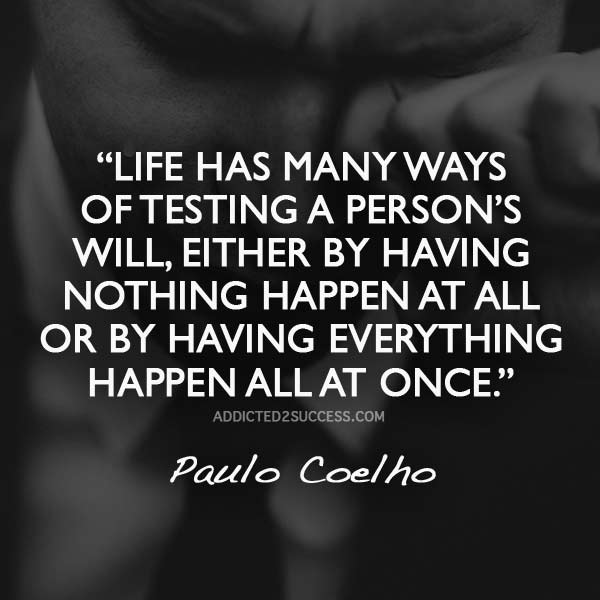Change Your Mindset
72 Positive Thinking Quotes For More Inner Strength & Growth

Here is a collection of Positive Thinking Quotes that will build your inner strength and help you grow mentally & spiritually so that you can live a successful and optimistic life.
Studies have shown that positive thinking can help with stress management and better health, two very important components that are needed to move through life with energy and enthusiasm.
72 Positive Thinking Quotes
“Life has many ways of testing a person’s will, either by having nothing happen at all or by having everything happen all at once.” – Paulo Coelho
“There are two ways of spreading light: to be the candle, or the mirror that reflects it.” – Edith Wharton
“With everything that has happened to you, you can either feel sorry for yourself or treat what has happened as a gift. Everything is either an opportunity to grow or an obstacle to keep you from growing. You get to choose.” – Dr. Wayne W Dyer
“Believe in yourself! Have faith in your abilities! Without a humble but reasonable confidence in your own powers you cannot be successful or happy.” – Norman Vincent Peale
“Hate. It has caused a lot of problems in this world but has not solved one yet.” – Maya Angelou
“If opportunity doesn’t knock, build a door.” – Milton Berle
“An attitude of positive expectation is the mark of the superior personality.” – Brian Tracy
“Success consists of going from failure to failure without loss of enthusiasm.” – Winston Churchill
“If you can dream it, then you can achieve it. You will get all you want in life if you help enough other people get what they want.” – Zig Ziglar
“The only place where your dream becomes impossible is in your own thinking.” – Robert H Schuller
“We don’t see things as they are, we see them as we are.” – Anais Nin
“Our greatest weakness lies in giving up. The most certain way to succeed is always to try just one more time.” – Thomas Edison
“I may not have gone where I intended to go, but I think I have ended up where I needed to be.” – Douglas Adams
“Learning is a gift. Even when pain is your teacher.” – Maya Watson
“I’ve had a lot of worries in my life, most of which never happened” – Mark Twain
“You yourself, as much as anybody in the entire universe, deserve your love and affection.” – Buddha
“Hope is a waking dream.” – Aristotle
“The past has no power over the present moment.” – Eckhart Tolle
“I do believe we’re all connected. I do believe in positive energy. I do believe in the power of prayer. I do believe in putting good out into the world. And I believe in taking care of each other.” – Harvey Fierstein
“If you want light to come into your life, you need to stand where it is shining.” – Guy Finley
“Today is a new beginning, a chance to turn your failures into achievements & your sorrows into so goods. No room for excuses.” – Joel Brown
“Life is a gift, and it offers us the privilege, opportunity, and responsibility to give something back by becoming more.” – Tony Robbins
“We are all here for some special reason. Stop being a prisoner of your past. Become the architect of your future.” – Robin Sharma
“If you think you can do a thing or think you can’t do a thing, you’re right.” – Henry Ford
“No matter what the situation, remind yourself “I have a choice.” – Deepak Chopra
“All you can change is yourself, but sometimes that changes everything!” – Gary W Goldstein
“The will to win, the desire to succeed, the urge to reach your full potential… these are the keys that will unlock the door to personal excellence.” – Confucius
“If we’re growing, we’re always going to be out of our comfort zone.” – John C Maxwell
“Take chances, make mistakes. That’s how you grow. Pain nourishes your courage. You have to fail in order to practice being brave.” – Mary Tyler Moore
“I am the greatest, I said that even before I knew I was.” – Muhammad Ali
“We are responsible for what we are, and whatever we wish ourselves to be, we have the power to make ourselves.” – Swami Vivekananda
“The difference between stumbling blocks and stepping stones is how you use them.” – Unknown
“If someone tells you, “You can’t” they really mean, “I can’t.” – Sean Stephenson
“There is little difference in people, but that little difference makes a big difference. The little difference is attitude. The big difference is whether it is positive or negative.” – W. Clement Stone
“Whatever you want to do, do it now. There are only so many tomorrows.” – Michael Landon
“When I do good, I feel good. When I do bad, I feel bad. That’s my religion.” – Abraham Lincoln
37 Inspirational Quotes That Will Change Your Life
“The difference in winning and losing is most often…not quitting.” – Walt Disney
“You are never too old to set another goal or dream a new dream.” – C.S Lewis
“All things are difficult before they are easy.” – Thomas Fuller
“Success is falling nine times and getting up ten.” – Jon Bon Jovi
“Happiness, like unhappiness, is a proactive choice.” – Stephen Covey
“Be soft. Do not let the world make you hard. Do not let pain make you hate. Do not let the bitterness steal your sweetness. Take pride that even though the rest of the world may disagree, you still believe it to be a beautiful place.” – Kurt Vonnegut
“You must make a decision that you are going to move on. It wont happen automatically. You will have to rise up and say, ‘I don’t care how hard this is, I don’t care how disappointed I am, I’m not going to let this get the best of me. I’m moving on with my life.” – Joel Osteen
“The next time you feel slightly uncomfortable with the pressure in your life, remember no pressure, no diamonds. Pressure is a part of success.” – Eric Thomas
“When the world pushes you to your knees, you’re in the perfect position to pray.” – Rumi
“If you can change your mind, you can change your life.” – William James
“When we are no longer able to change a situation, we are challenged to change ourselves.” – Viktor Frankl
“Happiness often sneaks in through a door you didn’t know you left open.” – John Barrymore
“The best way to gain self-confidence is to do what you are afraid to do.” – Unknown
“Millions saw the apple fall, but Newton was the one who asked why.” – Bernard Baruch
“Doing is a quantum leap from imagining.” – Barbara Sher
“Find a place inside where there’s joy, and the joy will burn out the pain.” – Joseph Campbell
“The mind is everything. What you think you become.” – Buddha
“Learn from yesterday, live for today, hope for tomorrow. The important thing is not to stop questioning.” – Albert Einstein
“Love is the only force capable of transforming an enemy into friend.” – Dr. Martin Luther King, Jr.
“Once you replace negative thoughts with positive ones, you’ll start having positive results.” – Willie Nelson
“What lies behind you and what lies in front of you, pales in comparison to what lies inside of you.” – Ralph Waldo Emerson
“One of the most efficient ways you can improve your life is by simply thinking in a more positive way.” – Robert Norman
“Much of our pain or misery in life stems from our own outlook towards the situation. A paralyzed person can also be happy, so can be a financially poor family.” – Amit Ahlawat
“Be vigilant; guard your mind against negative thoughts.”– Buddha
“Research shows there is a strong correlation between positive feelings toward your job, and job performance and productivity.” – Reen Rose
“Five percent of the people think; ten percent of the people think they think; and the other eighty-five percent would rather die than think.”– Thomas Edison
“When you consistently maintain a positive frame of mind, you’ll become known as a problem-solver rather than a complainer. People avoid complainers. They seek out problem-solvers.” Joseph Sommerville
“You can give in to the failure messages and be a bitter deadbeat of excuses. Or you can choose to be happy and positive and excited about life.” – A.L. Williams
“If you focus on the possible when you experience difficult situations, you can positively change your outlook, reduce your stress, and concentrate on achieving things that otherwise may not have been possible.” – Catherine Pulsifer
“I’ve always believed that if you put in the work, the results will come. I don’t do things halfheartedly because I know if I do, then I can expect halfhearted results.” – Michael Jordan
“Become a possibilitarian. No matter how dark things seem to be or actually are, raise your sights and see possibilities – always see them, for they’re always there.” – Norman Vincent Peale
“We think positive thoughts and we become a positive person” – Andrew Evans
“Keep your face to the sunshine and you cannot see a shadow.” – Helen Keller
“There are only two ways to live your life. One is as though nothing is a miracle. The other is as though everything is a miracle.” – Albert Einstein
“In the hopes of reaching the moon, men fail to see the flowers that blossom at their feet.” – Albert Schweizer

Thanks for dropping by. I hope you enjoyed this collection of Positive Thinking Quotes.
Email these to your friends and family and don’t forget to print these out to hang on your bedroom or cubicle wall. You will notice a difference in your day, and your future when you live your life with incredible positivity and energy.
Change Your Mindset
Peter Drucker’s Life Lessons Every Leader Needs to Hear
He believed life had no meaning if it was only about work

Peter Drucker is widely celebrated as the father of modern management. But beyond his groundbreaking theories and contributions to business thinking, Drucker lived a remarkably full and meaningful life, one that offers powerful lessons on leadership, balance, time management, and the pursuit of purpose. (more…)
Change Your Mindset
The Leadership Skill Nobody Talks About (But Changes Everything)
Curiosity often takes a back seat to certainty and gets labeled as a soft skill, which makes it sound obvious and easy

Most of us, when faced with challenges, instinctively seek certainty and answers. In turn, our ego steps in and prompts us to defend our views, double down, or perhaps disengage. (more…)
Personal Development
Want to Change the World? Start by Sharing Your Knowledge
When we’re exposed to new perspectives, our thinking expands, and so does our potential to create

The Power of Ideas
In October 1904, during a thirty-six-hour train journey from Johannesburg to Durban, Mahatma Gandhi read Unto This Last by John Ruskin, a book that would radically alter the course of his life. Reflecting on that night, Gandhi said, “I could not get any sleep. I was determined to change my life by the ideals of the book.” (more…)
Personal Development
Burned Out at Your Desk? Try This 5-Minute Mental Reset
This kind of fatigue doesn’t always feel dramatic, but it’s deadly for momentum

-

 Did You Know4 weeks ago
Did You Know4 weeks ago7 Surprising Life Lessons Video Games Taught Me That School Never Did
-

 Success Advice4 weeks ago
Success Advice4 weeks agoHow Playing by the Rules Became the Smartest Business Strategy
-

 Success Advice4 weeks ago
Success Advice4 weeks agoHow to Build Trust, Kill Micromanagement, and Lead a Team That Thrives
-

 Success Advice3 weeks ago
Success Advice3 weeks agoSuccess Isn’t Sexy: 5 Daily Habits That Actually Work
-

 Scale Your Business3 weeks ago
Scale Your Business3 weeks agoHow to Build a Workplace People Actually Want to Show Up To
-

 Scale Your Business3 weeks ago
Scale Your Business3 weeks agoHow Smart Entrepreneurs Cut Financial Chaos in Half with One Simple Switch
-

 Success Advice3 weeks ago
Success Advice3 weeks agoBreaking the Bias: How Females Can Thrive In The Workplace in 2025
-

 Scale Your Business3 weeks ago
Scale Your Business3 weeks agoThis Is How Successful Entrepreneurs Manage Their Time Differently






























81 Comments